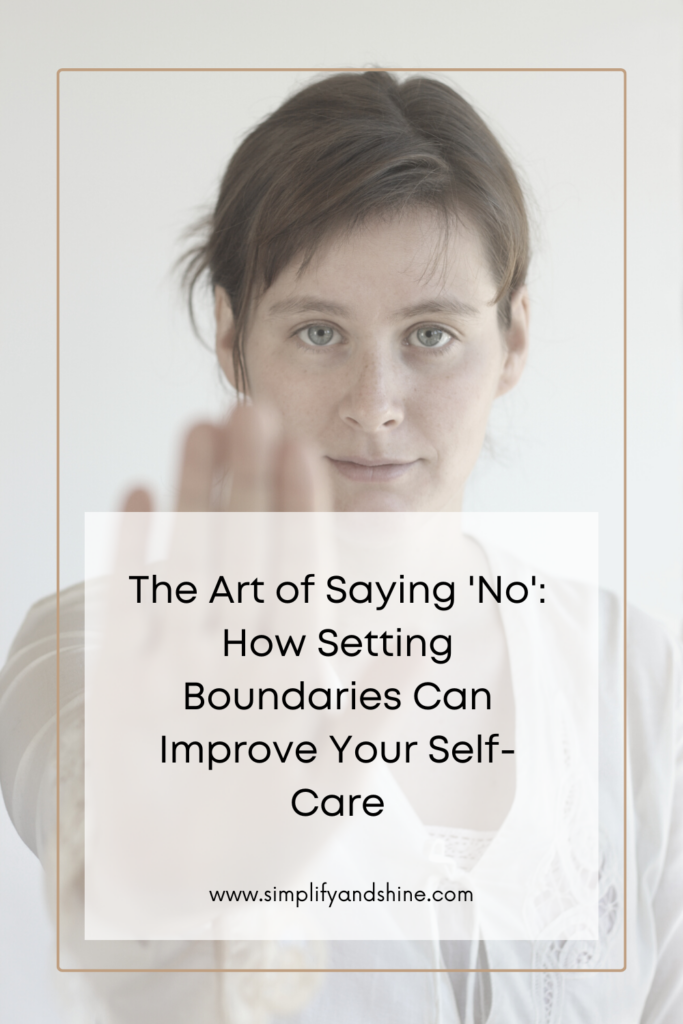The Art of Saying ‘No’: How Setting Boundaries Can Improve Your Self-Care
As women, we’re often expected to be everything to everyone – the perfect partner, the perfect mother, the perfect employee or the entrepreneur. We’re praised for our ability to multitask, juggle multiple responsibilities, and always be there for others. However, this pressure to constantly be “on” can take a toll on our mental and physical health.
Many of us have been conditioned to believe that saying “no” is selfish or rude. We don’t want to disappoint others or be seen as unreliable. So we say “yes” to everything, even when it means sacrificing our own needs and well-being.
The problem with this mindset is that it’s unsustainable. We can’t pour from an empty cup – if we don’t take care of ourselves, we’ll eventually burn out. That’s where setting boundaries comes in. By learning to say “no” in a respectful and effective way, we can prioritize our own needs and make time for self-care.
But setting boundaries isn’t just about improving your self-care – it’s also a powerful act of self-empowerment. When we’re clear about our limits and needs, we send a message to ourselves and others that we value ourselves and our time. We show that we’re willing to stand up for ourselves and prioritize our own well-being. Over time, setting boundaries can help us build confidence and assertiveness, which can benefit every aspect of our lives.
So if you’re feeling overwhelmed, stressed, or like you’re constantly putting others’ needs before your own, it might be time to start setting boundaries. It’s not always easy, but it’s an important step towards improving your self-care and self-empowerment. In the rest of this article, we’ll share some tips for how to set boundaries in a way that’s respectful, effective, and empowering.
RELATED: THE ROLE OF SELF-CARE IN HAPPINESS
Boundaries help you prioritize your own needs
When we say “yes” to everything, we can end up feeling overwhelmed and burnt out. Setting boundaries helps us prioritize our own needs and make time for self-care. Whether it’s saying “no” to a work project that would require you to work overtime, or declining an invitation to a social event because you need some alone time, setting boundaries allows you to put your own needs first.
Boundaries improve your relationships
Setting boundaries doesn’t just benefit you, it can also improve your relationships. When you’re clear about your limits and needs, others are more likely to respect them. This can lead to healthier and more fulfilling relationships, both at home and at work.
Boundaries increase your self-empowerment
Saying “no” can be difficult, especially if you’re used to saying “yes” to everything. But setting boundaries is a powerful act of self-empowerment. It shows that you value yourself and your time and that you’re willing to stand up for yourself. Over time, setting boundaries can help you build confidence and assertiveness.
RELATED: YOU CAN START OVER WHENEVER YOU WANT
So how can you start setting boundaries? Here are some tips:
Get clear on your priorities
Before you can set boundaries, you need to know what your priorities are. Take some time to reflect on what’s most important to you. Is it spending time with your family? Taking care of your health? Pursuing a creative hobby? Once you have a clear sense of your priorities, you can start setting boundaries around them.
Practice saying “no”
Saying “no” can be uncomfortable, but it’s a skill that can be learned. Start by practising in low-stakes situations, such as declining an invitation to an event you’re not interested in. As you become more comfortable, you can start setting boundaries in more challenging situations.
Use “I” statements
When setting boundaries, it’s important to communicate assertively but respectfully. One way to do this is to use “I” statements. For example, instead of saying “You’re always asking too much of me,” you could say “I need to focus on my own priorities right now.”
Be consistent
Setting boundaries is only effective if you stick to them. Be consistent in enforcing your boundaries, even if it feels uncomfortable at first. Over time, others will come to respect your limits and needs.
Remember, setting boundaries isn’t selfish – it’s an act of self-care and self-empowerment. By prioritizing your own needs and communicating them clearly, you can create a happier, healthier, and more fulfilling life for yourself and those around you.

In summary, setting boundaries is an important aspect of self-care and self-empowerment. By learning to say “no” in a respectful and effective way, we can prioritize our own needs and well-being, build confidence and assertiveness, and improve our relationships with others. As women who often take on multiple responsibilities, it’s crucial to remember that taking care of ourselves is not selfish – it’s necessary for our own health and happiness, and for our ability to be there for others in the long run.
If you have any thoughts or questions about setting boundaries or self-care, we’d love to hear from you! Leave a comment below and let’s continue the conversation. Remember, you deserve to prioritize your own needs and well-being – and setting boundaries is one way to make that happen.




